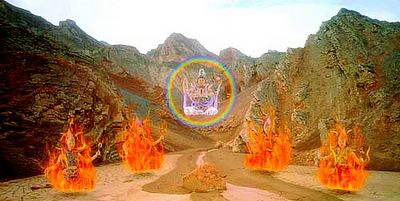
photographs by
Mariko MoriMA divides the world
An edge represented the limit of one world, assuming the existence of another world beyond. Anything that crossed, filled, or projected into the chasm of MA (the space between two edges) was designated hashi…
Ascending a bridge to reach the gods on high, marking boundaries by stretching ropes, embarking on the ship of the dead for the paradise beyond the seas, the chopsticks that the morsel travels to bridge the MA between the plate and the mouth, all these are hashi – the bridging of MA
MA is maintained by absolute darkness
The ancient Japanese believed that spirits called
kami permeated the entire cosmos. They were conscious of the movements of the sun, which divided time and space. The sun created day and night, and life on earth as well as the world of darkness yami. The spirits dwelt in the world of shadows, the kingdom of the dead; they appeared on earth at specific times, then disappeared again into darkness.
Clock
Sunrise and sunset measured time in daily life in Japan, once upon a …
The interval between sunrise and sunset was divided into six equal parts, differing in length according to the length of the day and night at the particular time of year
In the 16th century, western-designed clocks were brought to Japan, but ultimately they were modified, by the addition of supplementary mechanisms, to accommodate the Japanese system of sunrise-sunset time measurement. This circumstance testifies to the absence of any idea of “absolute time� in Japan. In western thought, time is absolute, flowing uninterruptedly from the past to the future. The Japanese never had such a concept.
Traditional Japanese music ensemble plays without a conductor and the music is modified by the interactions of the players. Each player possesses an intuitive rhythm which produces a certain spontaneity of composition. Thus, Japanese music does not follow “absolute time� – represented by the metronome. The subtle differentiated time-patterns offered by the individual players create omnipresent currents of music.
MA is a place where life is livedMA – the space where people live – becomes attractive to us only when it bears traces of the life it shelters
MA is the way of sensing the moment of movement
Utsori = the exact moment when the
kami spirit entered into and occupied a vacant space. And signifies the moment when the shadow of the spirit emerged from the void;
the moment when nature is transformed, the passage from one state to another.
The fading of life, the wilting of flowers, the flickering movements of the soul, the shadows cast on water and earth … this view of nature is deeply impressed on the Japanese soul reflected inarchitectural space, controlling transmission of light and lines of vision to produce ambiguous, indefinite space.
MA is the expectant stillness of the moment attending this kind of change, the changing world of nature.
..
.
.
.
.
.
MA is an alignment of signs
Ma is an empty place where phenomena appear, pass by, and disappear
.MA coordinates movement from one place to another
Space is divided by one’s movements and breath
Michiyuki = a process of going from one place to another, in which space is considered as a time-flow perceived through the character’s experience.
.MA is filled with signs of the ephemeral
Sabi is the state of the body after the spirit has departed + the beauty of fading colours, of objects patinated by the passage of time, of a stage of transfiguration that precedes destruction.
A sense of the dissolution of all things, all exists at a temporary stage in this approach to extinction. Visible objects fade gradually into shadows of themselves.
A birth-destruction cycle, repeating endlessly.
Aware of the inevitable conclusion, lacking all hope of escape from this fate, man has but one choice – to live from moment to moment. Sabi.
Kami descend into round stones
Sometimes what falls from heaven to earth becomes kami
Sometimes kami is what rises from earth to heaven
Plants, especially pines, are symbols of kami’s rebirth
Grasses especially reeds, represent a primordial life force in Japan.
Waters especially waves, move to and fro endlessly in patterns symbolic of eternity.
Utsushimi {utsu meaning void/projection; mi meaning body} = the physical which is projected into reality
The Japanese have great love for the seasons, for their flowers, birds, the moon and snow, and for the
“sound� of the wind . . .
“The city of the future is the ruin of the city of the present� – Arata Isozaki
Flowers are symbols of both life and death, but evergreen leaves are potent symbols of the soul . . .
God in Japanese is
kami
Kami has no physical body, its body and essence exist as a vacuum “a place entirely void of matter�. But void does not mean “nothing is there�, rather, “there is a hollow there� as “nothing (MU) exists there�.
Kami as the kehai (atmosphere of ch’i) which fills a void
Versus the Aristotellian principle of “Abhorrence of the vacuum�
Kami was thought to visit, to dwell temporarily in the mountains and the sea. The line of the mountains and hills against the sky, the horizon over the water, these were the kami’s proscenium arches where they entered and exist.
Not nature gods, but an abstract time-space god…
In the longer cycle, the time-space god would descend on the first day of the new year, in the shorter, every morning…
Kami does not abide: its nature is to arrive and then to depart.
The Japanese aesthetic of stillness and motion is what we call MA; the magnetic field from which the ch’I of kami subtly emanates . . .- Notes from 'Ma Space-Time in Japan': Cooper-Hewitt Museum, Exhibition Catalogue, New York, 1979listening to: computer humming, tap of fingers, crackle of engines





